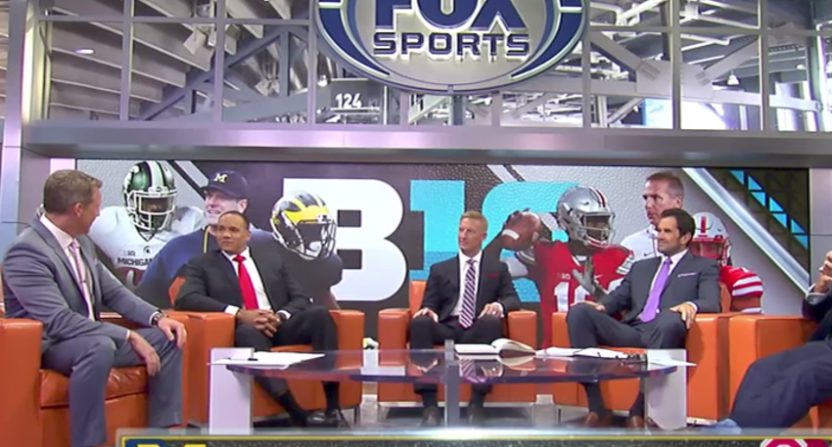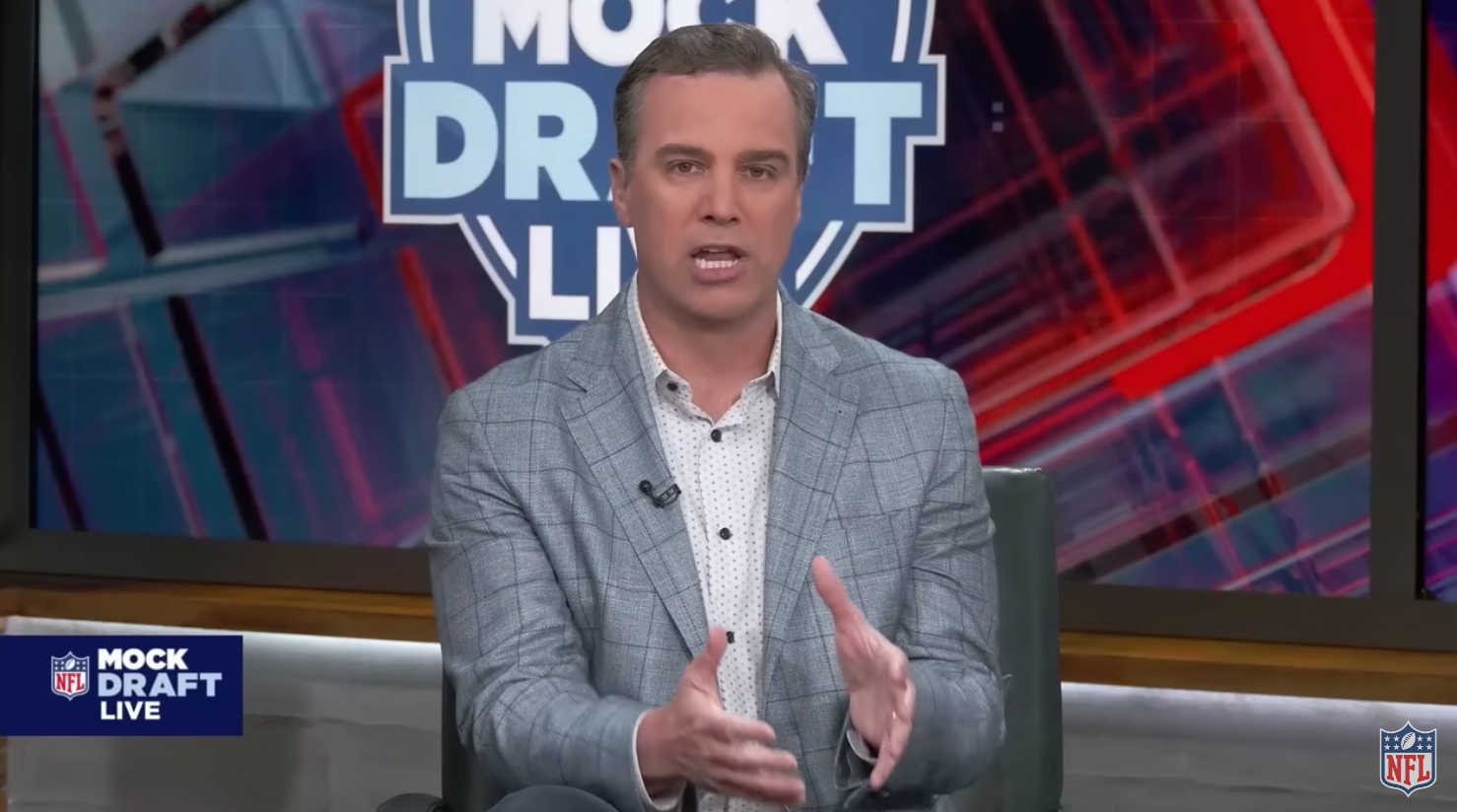Some of the largest impacts of any college football realignment, such as this week’s announcement that USC and UCLA are headed to the Big Ten in 2024, are for the networks that have deals to broadcast particular conferences. What value ESPN gets from their (full) SEC deal (and how much they pay for it) depends on who’s in that conference, and the same is true for Fox’s (partial) Big Ten deal. In Fox’s case, there are also effects from what a move means for the Big Ten Network, which they own 61 percent of. But what role those networks actually play in realignment is a hotly-debated subject, and it’s one that got some new attention this week thanks to a quote from an anonymous FBS athletic director relayed by Chris Vannini of The Athletic:
Even if ESPN and Fox don’t directly say “Add this team,” they make it clear who they’ll pay more money for and who they won’t. Those conversations happen all the time. It’s basic business.
“I think they are quietly behind the scenes,” one FBS athletic director told The Athletic. “They really don’t like to be known as deciding who is in what league, but don’t think there aren’t conversations of, ‘If we take this property, how much value are they going to bring?’ We’re not picking random schools. … They just don’t want the optics of them deciding, but the money is coming from them. They have to tell the league or someone (the TV value of schools).”
There’s a lot of important history to consider here, as over the last decade-plus of realignment, networks have frequently come up. One of the most notable cases was in 2011 around the realignment that saw Syracuse and Pittsburgh leave the Big East for the ACC, where then-Boston College athletic director Gene DeFilippo provided a rare candid on-the-record quote on what drives conference expansion to Mark Blaudschun of The Boston Globe. That quote wound up getting republished countless times, often out of context, and it led to a whole lot of knock-on impacts, so it’s worth relaying it in its original context before discussing it:
According to sources in the Big East and ACC, the idea is to reestablish the ACC as the preeminent conference in college basketball and was a predatory strike at the Big East, which, while struggling to improve its BCS rankings in football, had established itself as the runaway leader in basketball.
…BC athletic director Gene DeFilippo, who was part of the 12-member ACC expansion committee, adamantly denied that the move was dictated by basketball interests, but he did concede that the effects of it may boost that sport more than football.
“It had nothing to do with basketball,’’ said DeFilippo. “It was football money which drove expansion. It was football money and securing our future.’’
…The ACC just signed a new deal with ESPN that will increase the revenue for each school to approximately $13 million. With the addition of Pittsburgh and Syracuse, said DeFilippo, another significant increase will come.
“We always keep our television partners close to us,’’ he said. “You don’t get extra money for basketball. It’s 85 percent football money. TV – ESPN – is the one who told us what to do. This was football; it had nothing to do with basketball.’’
That last quote of “TV – ESPN – is the one who told us what to do” was intended as a pushback against the idea that this expansion was a basketball- and Duke-driven move, but it took on a life of its own. It led to ESPN putting on a full-out PR offensive against that, to the ACC also issuing denials, and to DeFilippo eventually walking back his comments. And that pattern’s been seen since then, too, particularly last year around Texas and Oklahoma heading to the SEC. That saw an anonymous Big 12 AD tell Bruce Feldman and Sam Khan Jr. of The Athletic “I think this has been going on for six months — at a minimum of probably three months — and ESPN has been right in the middle of it.” That realignment also saw the Big 12 send a cease-and-desist to ESPN (one of their media partners!), saw ESPN push back publicly on suggestions they were involved, and saw former ESPN president John Skipper speak out on both that move (which he was not involved with) and ESPN’s Longhorn Network deal with Texas (which he very much was involved with):
“I doubt all of that is unrelated. I would not assume that this is just happening, that one day the Texas and Oklahoma guys woke up, I would guess that it’s a logical sequence of events that ESPN now has all of the SEC, now they bring Texas and Oklahoma in. Think of all the good games you get.”
…”Texas had decided to do a network, we didn’t give them the idea. But we knew if we did the network, we could entice them to stay in the Big 12. Keep them together, that was important to us. We already had a Pac-12 deal, but FOX was ascendent in the Pac-12. We didn’t want to see Texas go to the Pac-12.”
It’s also worth noting that this isn’t just about the current Power Five conferences. Indeed, American Athletic Conference ADs told The Athletic’s Nicole Auerbach last summer that they were looking to be “an aggressor” and perhaps pick off remaining Big 12 teams after the Texas-Oklahoma departures, with one AD saying “We’ve already got ESPN at the table.” As we noted then, that seemed like wishful thinking considering how the AAC’s TV deal was so much smaller than the Big 12’s (and it proved to be, with the Big 12 eventually poaching AAC schools, not the reverse), but it’s interesting that an AD thought having a deal with ESPN was a notable factor in their conference’s favor around realignment.
The AD quotes Vannini relayed this week are a significant addition to this conversation. On if Fox and ESPN (Fox in this case, because the USC and UCLA moves are to the Big Ten, where they not only have majority rights but are also helping to pick who else gets rights) are driving this, “I think they are quietly behind the scenes” is a notable claim, and one that fits in with those past discussions (anonymous and on-the-record) of network involvement. But the “We’re not picking random schools” and “They have to tell the league or someone (the TV value of schools)” part of that establishes a very minimal and specific baseline of “involvement” relative to some of these past claims, and it sets up an interesting discussion on if even that level of “involvement” from networks should be accepted or not. (We don’t have absolute proof that it is, so this is a theoretical debate for now.) Simply put, it sets up the question of “Should networks tell conferences what certain schools would be worth to their TV deals?”
On the “pro” side, realignment is a long and complicated process impacting countless athletes (the majority of them in sports TV isn’t even particularly concerned with), fans, coaches, school administrators, conference executives, and more. A school going from one conference to another is not a decision that should be made lightly. And there’s an argument that the net impact of realignment decisions is better if they’re made with as accurate information as possible.
Much of a school’s television value can be estimated from various public pieces of information. See our calculation of the baseline value adding USC and UCLA might have for the Big Ten Network from a per-subscriber fee standpoint, or our discussions of individual schools’ TV viewership. But those are raw estimates with a lot of assumptions, and they also come with a lot of correlated variables. For example, the TV viewership for any particular game depends on a wide variety of factors, including the network and its distribution, the time, the opponent, both teams’ records and rankings to date, how much promotion the game has received, and more
Athletic directors and their staff can likely get a decent idea of how valuable certain schools are without network comment. It’s no surprise to anyone that Texas, Oklahoma, USC, and UCLA are valuable schools. . It’s no secret that something like Ohio State-Michigan tends to be one of the most–watched games of the year, which is why the Fox move to gain first pick of Big Ten games (which they’ve always used on that game) in the 2017 media deals was so important. (A graphic of Fox discussing the Big Ten and the Ohio State-Michigan game in particular, often promoted even at their network-wide upfronts, is seen at top.)
But ADs can’t necessarily get the exact value of extra money a network would pay for that school’s inclusion from publicly-available information. And the exact value matters quite a bit for expansion. Expansion means a conference’s rights fees are now being spread amongst more schools, so for it to be at least revenue-neutral for existing members, the media rights fees have to rise by enough to offset that growing denominator. So if networks completely refused to provide this information (or even an indication of “good” or “bad”) in even back-channel conversations, there’s the possibility of a conference expansion move that actually makes the per-school payout worse for the current conference members. That’s creating a lot of upheaval for something that doesn’t wind up being beneficial for most (at least not financially), and something that could create a lot of tensions in the new conference.
On the “con” side, though, there are significant conflict of interest discussions here. And conflict of interest discussions around networks matter more in college football than almost anywhere else. College football’s current playoff format is highly subjective, with a committee deciding which four teams get in and no automatic qualification. College football also has a setup where networks have deals with individual conferences (and even individual schools, particularly in the cases of Notre Dame and Texas).
Sports like the NHL and NBA have their U.S. rights shared by multiple networks (ESPN and Turner for both of those), but those networks aren’t tied to particular teams or conferences: which conference finals they broadcast in the playoffs typically changes year to year. In college football, that’s not the case, and there are all sorts of ways networks could tip the scale to benefit particular schools or leagues. The discussion of potential bias in even on-air commentary also comes into this, and is also part of why ESPN has previously pushed back so hard publicly against talk of their involvement in realignment.
It also should factor in that Fox and ESPN in particular have deals with many of these conferences (at the moment, they share rights in the Big 12, the Pac-12, and the Big Ten), so there’s the potential for them to be on both sides of a realignment, which could bias their valuations. There’s also the potential for one or the other network to pay more than a school is strictly “worth” in order to get it away from the other network. And that’s what’s spurred talk of “the ESPN conference” and “the Fox conference” over the years, which looks rather prescient now:
Damn. Nailed it in 2011 https://t.co/8sj6jMD4UU
— Awful Announcing (@awfulannouncing) July 2, 2022
Given that, there’s an argument that networks sharing even an estimated value (or even a “good” or “bad”) on potential expansion additions, even solely through back channels, is too much involvement for those networks. From a standpoint of being completely fair to all conferences and schools, there’s an argument for a policy of “We’re not getting involved; make your moves and talk to us once you have.” But that does come with the disadvantage of some potential conference expansion moves that don’t wind up actually being lucrative for schools. And that might see even more conference instability and realignment as a result. If schools only jump when everyone involved has a good handle on what the near-term financial implications will be thanks to network comment, that’s likely producing less moves overall.
All in all, conference realignment is going to impact networks and TV deals. The question is about how much of an impact those networks should have on the process. And there are a lot of potential levels of involvement there, from the active mover of “ESPN is the one who told us what to do” to the passive conversations of “they have to tell the league or someone (the TV value of schools).” The active mover levels are obviously much worse for the networks on an optics side, and that’s contributed to the pushback they’ve displayed in the past against those kinds of claims. But the much lower level of network involvement around the idea of passively relaying valuations when asked is what makes for an interesting debate.
Are networks willing to commit to saying “We don’t, and won’t, even do that?” Are conferences, schools, media, and fans going to call for networks not to have even that much involvement? Or is everyone involved okay with those kind of backroom checks, which may trigger some realignment, but may avoid other realignments that don’t benefit anyone? It’s not a settled question, but it is one worth discussion. And it will be interesting to see if these networks push back publicly against claims they’re involved just on value-checking, or if that level of involvement is something they’re fine leaving out there without dispute.







